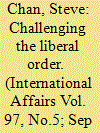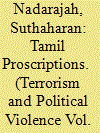| Srl | Item |
| 1 |
ID:
180365


|
|
|
|
|
| Summary/Abstract |
Current discourse on International Relations conflates international order and the interstate distribution of power. Many studies fail to clarify the concept of international order or to provide systematic empirical analysis that compares states' conduct in relation to this order. The prevailing tendency relies instead on rhetorical assertion or definitional fiat to attribute revisionist and status-quo motivations to different countries. For example, power-transition theory claims that rising states are typically revisionist, whereas established states are committed to the status quo. This article presents a contrarian view, arguing that the dominant or established state can be a revisionist. This state is not forever committed to those rules and institutions of international order that it has played a decisive role in fostering. Conversely, a rising state is not inevitably bent on challenging the order that has enabled its ascendance. Revisionism is thus not unique to a rising power; moreover, this state is not destined to be a challenger to international order and an instigator of systemic war as typically depicted in the current literature. I advance these propositions in the context of recent conduct by China and the US, suggesting that whereas China has become less revisionist over time (even while its power has increased), the US has become more so especially during the Trump administration. The major impetus challenging the liberal international order has come more from domestic sources in the West than from China.
|
|
|
|
|
|
|
|
|
|
|
|
|
|
|
|
| 2 |
ID:
159893


|
|
|
|
|
| Summary/Abstract |
Conventional analyses of terrorism proscription rely on conceptions of policy in terms of bureaucratic institutions and processes functioning according to means-end rationality, and law as an institutionalised body of rules expressive of sovereign power. By contrast, this article argues that the workings of Western terrorism proscription are inseparable from and deeply conditioned by situated interpretations of the contexts and dynamics within which West-led interventions for global stability—equated with liberal order—are pursued. Predicated on a seemingly self-evident division between “liberal” conduct, actors, and practices and illiberal ones which threaten the former, the production of good order requires the strengthening of the former, and the disciplining, transformation, or destruction of the latter. However, categorisations as “liberal” or “non-liberal” are not derived from “objective” criteria, but always mutually dependent on the situated interpretations by (self-recognised) liberals of the contexts within which they are intervening. Taking an interpretive approach that treats state action as situated practice, the article traces Western states’ security engagement with Sri Lanka before, during, and after the armed conflict (1983–2009) to show how changing calculations for liberal peace there governed evolving proscription practices in relation to the LTTE and the Tamil diaspora.
|
|
|
|
|
|
|
|
|
|
|
|
|
|
|
|